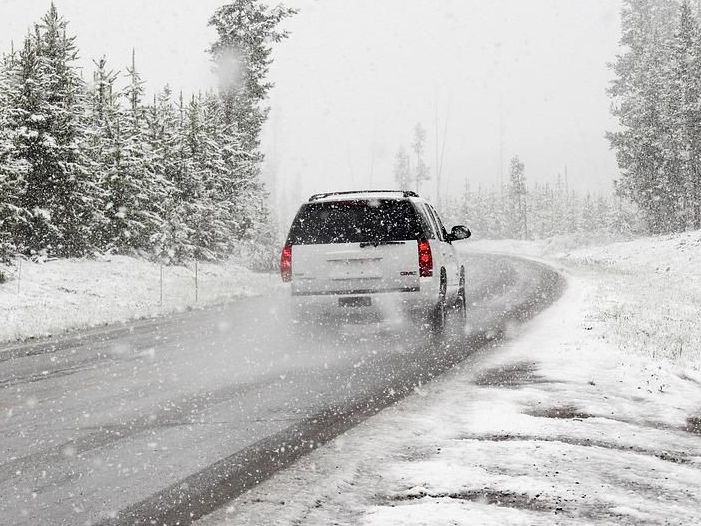160 Owen St Lake Mills, WI 53551
Monday, Wednesday–Friday: 7:30 A.M.–5:00 P.M. | Tuesday: 7:30 A.M.–6:30 P.M.
Winter Tires
Navigating Winter Roads With Confidence: The Right Winter Tires for Your Vehicle
Snow tires, or winter tires, are a crucial part of any driver's winter weather arsenal. Anyone who lives in a snowy climate can benefit from installing snow tires on their vehicle. They can help reduce the risk of an accident and improve the vehicle's traction control even in blizzard conditions.
Here at Ryan's Auto Care, we have an all-star technician team ready to install and maintain your vehicle's cold-weather tires.

What Are Winter Tires?
Winter tires are made for winter road safety. They're built with rubber tires with a higher ice grip rating, using a tread pattern that can cut deeper lines into snow or ice-coated roads. When conditions turn dangerous, a solid pair of snow and ice tires can see you through safe and sound.
Switching to Winter Tires
Different varieties of tires are suitable for different climates. A summer tire handles beautifully on a black asphalt highway on a sunny day, but things can turn rough in a hurry if it starts snowing. Snow and ice can cause drivers to lose control of the vehicle, potentially leading to a serious accident.
Yet, the risk of an accident isn't the only consideration in switching to winter tires. Even summer tires that make it through winter weather unscathed tend to suffer more wear and tear. Their tread patterns are made with warmer pavement in mind.
That's also why some people in hotter climates avoid switching to winter tires if they don't need to. Winter tires might not withstand hotter summer temperatures as efficiently as summer tires can, which can impact their performance over time. Ryan's Auto Care 's knowledgeable automotive team can help you save time and money in the long run by determining which tires are best for your environment.
Some distinguishing features of winter tires include:
- Tread Rubber: The rubber in winter tires is designed to remain flexible when temperatures turn cold. All-season tires or summer tires can become stiff in cold weather, but winter tires tend to retain their flexibility and traction under poor conditions.
- Tread Patterns: The difference in winter tires is also noticeable in their tread patterns. Winter tires can dig in and "hold" a snowy roadway better thanks to their tread depths and sipes — slits in the tire that literally "bite" into the edges of ice underneath.
Both of these features work together to deliver better control for your vehicle.
Winter Tires for Different Types of Vehicles
Different vehicle models utilize different kinds of winter tires as well. For instance, winter tires for cars include small incisions in their treads and are made of a silica compound to increase their flexibility for highway driving in the snow. But although they're winter tires, they're not necessarily made for safe handling on a completely unplowed roadway. Winter tires for cars handle best on plowed roads that could have some rough or slippery patches.
Likewise, larger vehicles like SUVs use winter tires better suited for unplowed roads. These are often the snow tires of choice for snowplow trucks and other vehicles forced to operate in severe winter conditions. The tires have wider gaps in their treads to apply a lot of downward pressure, increasing traction and forward power on an unplowed road. They're also made of a slightly harder compound than winter tires designed for cars.
If you're not sure about what type of winter tire suits your vehicle best, consider speaking with one of Ryan's Auto Care's experienced team members about it. Our technicians would be happy to help you find the ideal set of tires for your vehicle.
The Difference Between Studded and Non-Studded Tires
Many vehicles are still fitted with studs in their tires. Studded tires are usually the snow tire of choice in rural areas where snowfall can get overwhelming. Studs used to be regularly installed in areas with heavy winters, but recent advances in winter tire technology have made them much less common.
As powerful as they are, they're pretty noisy on dry surfaces. They also make the vehicle harder to drive and can be much more expensive to install. For most winter driving, common non-studded cold weather tires can do just fine.
How Do You Know When You Should Switch to Winter Tires?
The lower temperatures drop, the less effective summer and all-season tires become. Once the outside temperature goes lower than 45 degrees Fahrenheit, installing winter tires should become a priority. Keep in mind that temperatures tend to drop well below average in the morning and evening. If you're commuting around those hours, switching to winter tires well before temperatures hit 45 degrees Fahrenheit can be a great idea.
Your Choice for Winter Tire Installation is Ryan's Auto Care
Since 2001, Ryan's Auto Care
has been delivering stellar automotive maintenance and repair services to customers in the Lake Mills, WI
area. We're committed to giving you high-quality service that ensures the safety and longevity of your vehicle. For any questions or to schedule a winter tire installation, just call us at (920) 648-2009.
Contact Us
Hours
Monday, Wednesday - Friday: 7:30 am - 5:00 pm & Tuesday - 7:30 am - 6:30 pm
Get Social
Contact Us
We will get back to you as soon as possible.
Please try again later.
Navigation
Ryan's Auto Care is honored to serve the community of Lake Mills, WI with car repair and automotive repair services. We work hard to be the best auto shop in Lake Mills, WI and our automotive professionals always strive to provide our customers honest, efficient and friendly service. We also carry top brands that will suit your needs. Please contact us if you need automotive or car repair services.
All Rights Reserved • Privacy Policy & Terms of Use • Powered By



